

How Long is a Masters Thesis? [Your writing guide]
Writing a Masters thesis can be quite the undertaking. It presents the research findings of your graduate-level masters study. It can be difficult to work out exactly how much you need to write to pass your masters degree because you can generate so much research throughout your course.
The average masters thesis is typically between 50 and 100 pages long. The length of the thesis will vary depending on the discipline and the university requirements but will typically be around 25,000 to 50,000 words in length.

My Masters thesis in theoretical computational chemistry was 60 pages long. It was quite short for a master’s thesis in chemistry because of the theoretical computational twist. Some organic chemistry Master theses were much longer – in terms of pages – because they relied on a lot of diagrams and schematics to explain their work.
Irrespective of its length, a master’s thesis must demonstrate an individual’s ability to conduct independent research and to effectively express their findings in writing.
It must pass peer-review and is often accompanied with a short oral presentation about the work to an academic committee put together by their advisor.
It must also show that the student has acquired sufficient knowledge about their chosen subject to contribute to existing scholarship in their field. Once you have graduated with your masters you can then consider whether or not a PhD is a good option for your career goals.
How Many Pages Should a Master Thesis Have?
Typically, a master thesis is expected to be anywhere between 100-200 pages long depending on the research field and topic.
In general, most master theses should have at least 30-40 pages of research content (including a literature review) with an additional 10-20 pages for other aspects of academic reports such as acknowledgements, appendices, abstracts, references and schematics or diagrams.
Furthermore, certain schools may require that your master thesis meet additional criteria such as formatting guidelines or word counts in order to be considered complete.
Your supervisor should not let your master’s thesis go to examination if it does not meet the minimum requirements for your specific field. Your academic supervisor will be your biggest asset while writing your master’s thesis.
If you want to know more about how long a Masters’s thesis and PhD dissertation is you can check out my other articles:
- How long is a Thesis or dissertation? [the data]
- Is writing a masters thesis hard? Tips on how to write a thesis
- How to write a masters thesis in 2 months [Easy steps to start writing]
How is a Masters thesis assessed and examined?
A Masters dissertation is assessed by academics in your department or university and it may also include an external examination by experts in the specific field you are studying.
The thesis will typically require a student to conduct extensive research to answer a research question and come up with an original argument or thesis on the topic.
Once the thesis has been written, the student must submit it to their faculty or university for assessment and examination.
The university will then grade the dissertation based on its content, structure, and accuracy. Most universities require that the dissertation be at least 60 pages in length and be written according to academic standards of writing and style guides.
These academic writing style guides can be very confusing and are often not something people have encountered before. However, reaching out to, and using the services of, a trusted editor will help make the process much easier.
The faculty at the university will then assess the submitted dissertation and provide feedback to help guide the student in making any necessary corrections or revisions before finally submitting it for examination.
Sometimes the examiners will require the thesis to undergo small amendments.
This is quite normal and you will be expected to address each of the criticisms before being admitted to your degree.
Also, many institutions require a public presentation on your Masters research for admission to the degree. This can be relatively nerve racking for young career academics. Nonetheless, presenting your work to a general audience is always good experience and will help prepare you for a PhD if you decide to pursue further research studies.
Effective tips on how to write a thesis successfully
Writing a master’s thesis is not an easy task and many students struggle to complete it with a smile on their faces.
Making sure that you work on your thesis little by little and that you do not get bogged down in the details too quickly is an important step to finishing your thesis without it causing too much mental anguish.
However, writing a thesis is often a very challenging thing no matter what you do. You can check out more about this in my YouTube video below right talk about the unglamorous truths about writing a thesis, whether it Masters, PhD or for peer review.
Small chunks
Work on your thesis in small chunks. Do not think of it as one big thesis but rather as small chapters and subsections within that chapter.
I actually had multiple documents with different chapters and did not combine my thesis until the end. This allowed me to compartmentalise my work and ensure that I was focused on one aspect of the thesis at a time without jumping between many other sections – which would have been a huge distraction.
Get feedback as often as possible
I’ve always been incredibly lucky with my research supervisors. I’ve been able to get feedback about my writing quickly and effectively.
Speak to your research supervisor about what would be an appropriate amount of work for them to mark at any given time.
Some supervisors like small amounts of work – such as a chapter or a subsection, whilst others prefer to have full chapters submitted at a time.
Try to work out the smallest amount of work they be happy to look over as then you can get feedback much quicker.
Also, you can reach out to other supervisors and academics that may be able to give you feedback on your writing. You do not just have two work with your primary supervisor when looking for feedback.
Do what you must to get through
Even though many helpful PhD and thesis writing blogs and videos talk about making yourself as productive as possible, the truth is sometimes you have to do whatever you can to get through.
For example, I used to eat a lot of chocolate and drink a lot of energy drinks to try to focus myself while writing up my thesis.
I only did this for a short period of time and it certainly wasn’t sustainable. But, when you have got a tight deadline sometimes you just have to do whatever you can to get through your writer’s block.
Protect your flow
Protect your flow as much as possible. Getting into a flow state can be achieved regularly if you change your environment to make sure that you are able to focus effectively.
For example, I like to completely turn off my mobile phone and email or other computer notifications so that I can focus for at least one hour on writing my thesis.
You may also find white noise helpful if you are in a particularly noisy environment such as a shared office.
If you find yourself becoming distracted – remove that distraction as best you can. Protecting your flow and working for one-hour blocks will really help you finish on time.
Wrapping up
This article has been through everything you need to know about the length of a Masters thesis and how to write your thesis effectively.
The length of a Masters thesis is very much dependent on the field of study and the University’s requirements for your course. Nonetheless, they are typically between 50 and 200 pages long and are examined by experts in the field and other academics before you are admitted into the degree.
There may also be a short presentation that is given to the public or academics in your department.

Dr Andrew Stapleton has a Masters and PhD in Chemistry from the UK and Australia. He has many years of research experience and has worked as a Postdoctoral Fellow and Associate at a number of Universities. Although having secured funding for his own research, he left academia to help others with his YouTube channel all about the inner workings of academia and how to make it work for you.
Thank you for visiting Academia Insider.
We are here to help you navigate Academia as painlessly as possible. We are supported by our readers and by visiting you are helping us earn a small amount through ads and affiliate revenue - Thank you!

2024 © Academia Insider
- Have your assignments done by seasoned writers. 24/7
- Contact us:
- +1 (213) 221-0069
- [email protected]

How Long is a Thesis or Dissertation: College, Grad or PhD

How long is a thesis
As a graduate student, you may have heard that you must complete a certain comprehensive project, either a thesis or a dissertation. In this guide, we will explore how long a thesis should be, the best length for a dissertation, and the optimal length for each part of the two.
If you read on to the end, we will also explore their differences to understand how it informs each length.
Both terms have distinct meanings, although they are sometimes used interchangeably and frequently confused.

Structure-wise, both papers have an introduction, a literature review, a body, a conclusion, a bibliography, and an appendix. That aside, both papers have some differences, as we shall see later on in this article.
How Long Should a Thesis be
Before discussing how long a thesis is, it’s critical to understand what it is. A thesis is a paper that marks the end of a study program.
Mostly, there is the undergraduate thesis, a project that marks the end of a bachelor’s degree, and a master’s thesis that marks the end of a master’s program.
A thesis should be around 50 pages long for a bachelor’s degree and 60-100 pages for a Master’s degree. However, the optimal length of a thesis project depends on the faculty’s instructions and the supervising professor’s expectations . The length also depends on the topic’s technicalities and the extent of research done.

A master’s thesis project is longer because it is a compilation of all your knowledge obtained in your master’s degree.
It basically allows you to demonstrate your abilities in your chosen field.
Often, graduate schools require students pursuing research-oriented degrees to write a thesis.
This is to demonstrate their practical skills before completing their degrees.
In contrast to undergraduate thesis, which are shorter in length and coverage area, usually less than 60 pages. A master’s theses are lengthy scholarly work allowing you to research a topic deeply.
Then you are required to write, expand the topic, and demonstrate what you have learned throughout the program. This is part of why you must write a thesis for some undergrad in some of the courses.
A Master’s thesis necessitates a large amount of research, which may include conducting interviews, surveys, and gathering information ( both primary and secondary) depending on the subject and field of study.
For this reason, the master’s thesis has between 60 and 100 pages, without including the bibliography. Mostly, the topic and research approach determine the length of the paper.
This means that there is no definite number of pages required. However, your thesis should be long enough to clearly and concisely present all important information.
Need Help with your Homework or Essays?
How long should a dissertation be.
A dissertation is a complex, in-depth research paper usually written by Ph.D. students. When writing the dissertation, Ph.D. Students are required to create their research, formulate a hypothesis, and conduct the study.
On average, a dissertation should be at least 90 pages at the minimum and 200 pages at the maximum , depending on the guidelines of the faculty and the professor. The optimal length for a dissertation also depends on the depth of the research done, the components of the file, and the level of study.

Most Ph.D. dissertations papers are between 120 to 200 pages on average.
However, as we said earlier, it all depends on factors like the field of study, and methods of data collection, among others.
Unlike a master’s thesis, which is about 100 pages, a dissertation is at least twice this length.
This is because you must develop a completely new concept, study it, research it, and defend it.
In your Ph.D. program, a dissertation allows you the opportunity to bring new knowledge, theories, or practices to your field of study.
The Lengths of Each Part of a Thesis and Dissertation
Factors determining the length of thesis or dissertation.
As we have seen, there is no definite length of a thesis and dissertation. Most of these two important academic documents average 100 to 400 pages. However, several factors determine their length.

Universities- we all know universities are independent bodies. Also, it’s important to know that each university is different from the other. As a result, the thesis and dissertation length varies depending on the set rules in a certain college or school.
Field of study- some fields of study have rich information, while others have limited information.
For example, you may have much to write about or discover when it comes to science compared to history.
As such, if you are to write a thesis or a dissertation in both fields, one will definitely be longer than the other. Check the time it takes to write a thesis or a dissertation to get more points.
Other factors that affect the length of a thesis or a dissertation include your writing style and the instructor’s specifications. These factors also come into play when it comes to the time taken to defend a thesis or your dissertation.
Tips for the Optimal Length for a Thesis or Dissertation
Instead of writing for length, write for brevity. The goal is to write the smallest feasible document with all of the material needed to describe the study and back up the interpretation. Ensure to avoid irrelevant tangents and excessive repetitions at all costs.
The only repetition required is the main theme. The working hypothesis seeks to be elaborated and proved in your paper.
The theme is developed in the introduction, expanded in the body, and mentioned in the abstract and conclusion.
Here are some tips for writing the right length of thesis and dissertation:
- Remove any interpretation portion which is only tangentially linked to your new findings.
- Use tables to keep track of information that is repeated.
- Include enough background information for the reader to understand the point of view.
- Make good use of figure captions.
- Let the table stand on its own. I.e., do not describe the contents of the figures and/or tables one by one in the text. Instead, highlight the most important patterns, objects, or trends in the figures and tables in the text.
- Leave out any observations or results in the text that you haven’t provided data.
- Do not include conclusions that aren’t backed up by your findings.
- Remove all inconclusive interpretation and discussion portions.
- Avoid unnecessary adjectives, prepositional phrases, and adverbs.
- Make your sentences shorter – avoid nesting clauses or phrases.
- Avoid idioms and instead use words whose meaning can be looked up in a dictionary.
We can Write your Papers! No Plagiarism
Get that A on your next essay assignment without the hassles. Any topic or subject. 100% Plagiarism-Free Essays.
Difference between a Thesis and a Dissertation
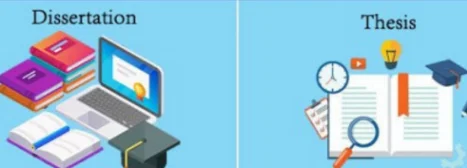
The most basic distinction between a thesis and a dissertation is when they are written.
While a thesis is a project completed after a master’s program, a dissertation is completed at the end of doctorate studies.
In a thesis, you present the results of your research to demonstrate that you have a thorough understanding of what you have studied during your master’s program.
On the other hand, a dissertation is your chance to add new knowledge, theories, or practices to your field while pursuing a doctorate. The goal here is to come up with a completely new concept, develop it, and defend it.
A master’s thesis is similar to the types of research papers you’re used to writing in your bachelor’s studies. It involves conducting research on a topic, analyzing it, and then commenting on your findings and how it applies to your research topic.
The thesis aims to demonstrate your capacity to think critically about and explain a topic in depth.
Furthermore, with a thesis, you typically use this time to elaborate on a topic that is most relevant to your professional area of specialization that you intend to pursue.
In a dissertation, on the other hand, you use other people’s research as an inspiration to help you come up with and prove your own hypothesis, idea, or concept. The majority of the data in a dissertation is credited to you.
Last but not least, these two major works differ greatly in length. The average length of a master’s thesis is at least 100 pages.
On the other hand, a doctoral dissertation should be substantially longer because it includes a lot of history and research information, as well as every element of your research, while explaining how you arrived at the information.
It is a complex piece of scholarly work, and it is likely to be twice or thrice the length of a thesis. To know the difference, check the best length for a thesis paper and see more about it.
Here is a Recap of the Differences
- While the thesis is completed at the end of your master’s degree program, a dissertation is written at the end of your doctoral degree program.
- Both documents also vary in length. A thesis should have at least 100 pages, while a doctoral dissertation is longer (over 200 pages)
- In the thesis, you conduct original research; in the dissertation, you use existing research to help you develop your discovery.
- For a thesis, you have to add analysis to the existing work, while a dissertation is part of the analysis of the existing work.
- In comparison to a thesis, a dissertation requires a more thorough study to expand your research in a certain topic.
- The statements in a thesis and a dissertation are distinct. While a thesis statement explains to readers how you will prove an argument in your research, a dissertation hypothesis defines and clarifies the outcomes you expect from your study. Here, you apply a theory to explore a certain topic.
- A dissertation allows you to contribute new knowledge to your field of study, while a thesis makes sure you understand what you have studied in your program and how it applies.
A thesis or a dissertation is a difficult document to compile. However, you should not be worried since your school assigns you a dissertation advisor who is a faculty member.
These advisors or supervisors help you find resources and ensure that your proposal is on the right track when you get stuck.
Check out my guide on the differences between a research paper, proposal, and thesis to understand more about these issues.

Josh Jasen or JJ as we fondly call him, is a senior academic editor at Grade Bees in charge of the writing department. When not managing complex essays and academic writing tasks, Josh is busy advising students on how to pass assignments. In his spare time, he loves playing football or walking with his dog around the park.
Related posts

caught buying dissertations
Avoid being Caught Buying Dissertations: Tips to Do it Right

Do Dissertation writing services work
Do Dissertation Writing services work? Is hiring someone Legal
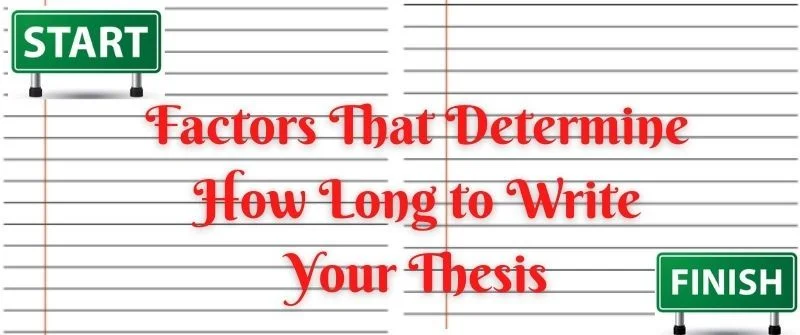
Time needed to write your thesis
Time to Write a Thesis or Dissertation: Tips to Finish Fast
While Sandel argues that pursuing perfection through genetic engineering would decrease our sense of humility, he claims that the sense of solidarity we would lose is also important.
This thesis summarizes several points in Sandel’s argument, but it does not make a claim about how we should understand his argument. A reader who read Sandel’s argument would not also need to read an essay based on this descriptive thesis.
Broad thesis (arguable, but difficult to support with evidence)
Michael Sandel’s arguments about genetic engineering do not take into consideration all the relevant issues.
This is an arguable claim because it would be possible to argue against it by saying that Michael Sandel’s arguments do take all of the relevant issues into consideration. But the claim is too broad. Because the thesis does not specify which “issues” it is focused on—or why it matters if they are considered—readers won’t know what the rest of the essay will argue, and the writer won’t know what to focus on. If there is a particular issue that Sandel does not address, then a more specific version of the thesis would include that issue—hand an explanation of why it is important.
Arguable thesis with analytical claim
While Sandel argues persuasively that our instinct to “remake” (54) ourselves into something ever more perfect is a problem, his belief that we can always draw a line between what is medically necessary and what makes us simply “better than well” (51) is less convincing.
This is an arguable analytical claim. To argue for this claim, the essay writer will need to show how evidence from the article itself points to this interpretation. It’s also a reasonable scope for a thesis because it can be supported with evidence available in the text and is neither too broad nor too narrow.
Arguable thesis with normative claim
Given Sandel’s argument against genetic enhancement, we should not allow parents to decide on using Human Growth Hormone for their children.
This thesis tells us what we should do about a particular issue discussed in Sandel’s article, but it does not tell us how we should understand Sandel’s argument.
Questions to ask about your thesis
- Is the thesis truly arguable? Does it speak to a genuine dilemma in the source, or would most readers automatically agree with it?
- Is the thesis too obvious? Again, would most or all readers agree with it without needing to see your argument?
- Is the thesis complex enough to require a whole essay's worth of argument?
- Is the thesis supportable with evidence from the text rather than with generalizations or outside research?
- Would anyone want to read a paper in which this thesis was developed? That is, can you explain what this paper is adding to our understanding of a problem, question, or topic?
- picture_as_pdf Thesis

- How Long Is a PhD Thesis?
- Doing a PhD
It’s no secret that one of the most challenging aspects of a PhD degree is the volume of work that goes into writing your thesis . So this raises the question, exactly how long is a thesis?
Unfortunately, there’s no one size fits all answer to this question. However, from the analysis of over 100 PhD theses, the average thesis length is between 80,000 and 100,000 words. A further analysis of 1000 PhD thesis shows the average number of pages to be 204 . In reality, the actual word count for each PhD thesis will depend on the specific subject and the university it is being hosted by. This is because universities set their own word length requirements, with most found to be opting for around 100,000.
To find out more about how these word limits differ between universities, how the average word count from STEM thesis differ from non-STEM thesis and a more detailed breakdown from the analysis of over 1000 PhDs, carry on reading the below.
Word Count Differences Between Universities
For any PhD student writing a thesis, they will find that their document will be subject to a word limit set by their university. In nearly all cases, the limit only concerns the maximum number of words and doesn’t place any restrictions on the minimum word limit. The reason for this is that the student will be expected to write their thesis with the aim of clearly explaining their research, and so it is up to the student to determine what he deems appropriate.
Saying this, it is well accepted amongst PhD students and supervisors that the absence of a lower limit doesn’t suggest that a thesis can be ‘light’. Your thesis will focus on several years worth of original research and explore new ideas, theories or concepts. Besides this, your thesis will need to cover a wide range of topics such as your literature review, research methodology, results and conclusion. Therefore, your examiners will expect the length of your thesis to be proportional to convey all this information to a sufficient level.
Selecting a handful of universities at random, they state the following thesis word limits on their website:
- University of Edinburgh: 100,000
- University of Exeter: 100,000
- University of Leister: 80,000
- University of Bath: 80,000
- University of Warwick: 70,000
The above universities set upper word limits that apply across the board, however, some universities, such as the University of Birmingham and the University of Sheffield, set different word limits for different departments. For example, the University of Sheffield adopts these limits:
- Arts & Humanities: 75,000
- Medicine, Dentistry & Health: 75,000
- Science: 80,000
- Social Sciences: 75,000-100,000
Although there’s a range of limit, it’s safe to say that the majority fall within the 80,000 to 100,000 bracket.
Word Count Based on Data from past Theses
A poll of 149 postdocs.
In mid-2019, Dr Eva Lantsoght, a published author, academic blogger and Structural Engineering Professor, conducted a poll which asked postgraduate doctoral students to share the length of their final thesis. 149 PostDoc students responded to the survey, with the majority reporting a length falling within the ‘80,000 – 120,000 words’ bracket as seen below.
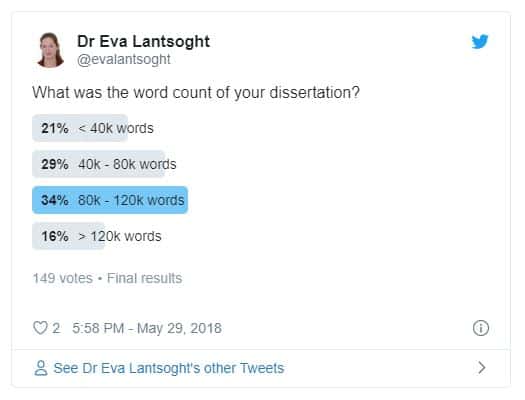
Analysis of 1000 PhD Theses
Over a three-year time period, Dr Ian Brailsford, a then Postgraduate Learning Adviser at the University of Auckland, analysed 1000 doctoral thesis submitted to his university’s library. The PhD theses which formed the basis of his analysis were produced between 2008 to 2017 and showed:
- Average number of pages = 204
- Median number of pages = 198
- Average number of chapters = 7.6
We should note that the above metrics only cover the content falling within the main body of the thesis. This includes the introduction, literature review, methods section, results chapter, discussions and conclusions. All other sections, such as the title page, abstract, table of contents, acknowledgements, bibliography and appendices were omitted from the count.
Although it’s impossible to draw the exact word count from the number of pages alone, by using the universities recommended format of 12pt Times New Roman and 1.5 lines spacing, and assuming 10% of the main body are figures and footnotes, this equates to an average main body of 52,000 words.
STEM vs Non-STEM
As part of Dr Ian Brailsford’s analysis, he also compared the length of STEM doctorate theses to non-STEM theses. He found that STEM theses tended to be shorter. In fact, he found STEM theses to have a medium page length of 159 whilst non-STEM theses had a medium of around 223 pages. This is a 40% increase in average length!
Can You Exceed the Word Count?
Whilst most universities will allow you to go over the word count if you need to, it comes with the caveat that you must have a very strong reason for needing to do so. Besides this, your supervisor will also need to support your request. This is to acknowledge that they have reviewed your situation and agree that exceeding the word limit will be absolutely necessary to avoid detriment unnecessary detriment to your work.
This means that whilst it is possible to submit a thesis over 100,000 words or more, it’s unlikely that your research project will need to.
How Does This Compare to a Masters Dissertation?
The average Masters dissertation length is approximately 20,000 words whilst a thesis is 4 to 5 times this length at approximately 80,000 – 100,000.
The key reason for this difference is because of the level of knowledge they convey. A Master’s dissertation focuses on concluding from existing knowledge whilst a PhD thesis focuses on drawing a conclusion from new knowledge. As a result, the thesis is significantly longer as the new knowledge needs to be well documented so it can be verified, disseminated and used to shape future research.
Finding a PhD has never been this easy – search for a PhD by keyword, location or academic area of interest.
Related Reading
Unfortunately, the completion of your thesis doesn’t mark the end of your degree just yet. Once you submit your thesis, it’s time to start preparing for your viva – the all-to-fun thesis defence interview! To help you prepare for this, we’ve produced a helpful guide which you can read here: The Complete Guide to PhD Vivas.
Browse PhDs Now
Join thousands of students.
Join thousands of other students and stay up to date with the latest PhD programmes, funding opportunities and advice.
How Long Is A Thesis Paper: Factors Involved & Formatting Tips
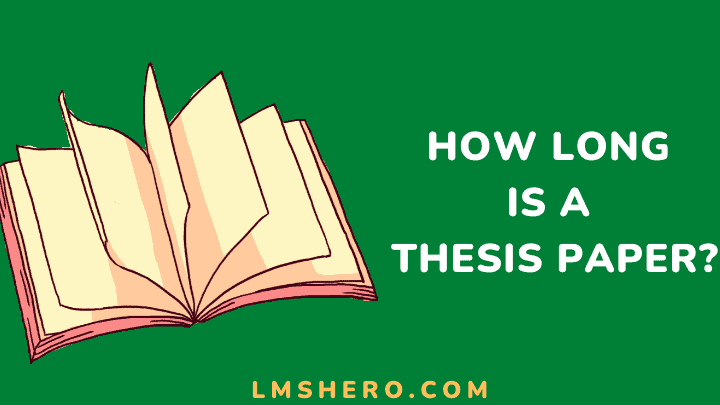
So you’re wondering “how long is a thesis paper?” The question has been tossed around by graduate students for as long as there have been graduate students.
There are many opinions on how long a thesis paper should be, but there is no right or wrong answer.
The length of your paper will depend on the complexity of the topic, the level of detail you include, and the overall length of your scholarly work.
In this article, you will discover the ideal length of a thesis paper and how to format it appropriately.
What is a thesis paper?
A thesis paper is a document you write as part of your academic degree program. It is your main argument for why you believe what you believe about a particular topic.
It’s an exploration of a topic undertaken to discover new knowledge. It’s the result of a process of intellectual growth, and it should be examined thoughtfully and critically.
A good thesis shows that you have explored the topic deeply and have come to some conclusions about it.
How long is a thesis paper?
It’s hard to put a number on how long a thesis paper should be because that depends on the individual writer, supervisor, the topic of the paper, and the types of data analysis and presentation.
However, a master’s thesis is generally between 50 – 80 pages and about 20,000 words, excluding the preliminary pages.
Note that no matter how long, one thing’s for sure: it’s worth your time and effort. Your thesis will not only reflect your intellectual prowess but also your dedication to your field of study.
So, commit to producing a high-quality thesis, and I guarantee you won’t regret it.
Factors that may determine the length of a thesis paper
When you decide to write a thesis, you choose to embark on a deep and personal exploration of a complex topic.
Many factors can influence your paper’s length – some of which are out of your control. They include but are not limited to:
- The quality and complexity of the thesis paper
- The extent to which the paper adheres to academic standards
- Clarity and conciseness of the writing
- Organization of the information
- Use of statistics and research methods
- The use of effective graphs, tables, and images (data presentation)
- The number of citations used in the paper will also affect the length
Although many factors can influence the length of a thesis paper, you will likely have the most success if you focus on four basic principles.
First, be aware of the types and research required for your topic. Furthermore, include enough detail to provide readers with a clear understanding of your argument.
In addition, pay attention to the format and structure of your paper. Fourth, make sure all your sources are properly cited and referenced.
Tips to properly format your thesis

1. Make the thesis title clear, concise, and easily understandable
When writing a thesis, it’s essential to make the title clear, concise, and easily understandable.
Too often, students cram too many ideas into a relatively brief title, making the paper difficult to read and understand.
When crafting your thesis title, it’s essential to make it clear, concise, and easily understandable.
This will help the reader see the main points of your paper quickly and easily and help them better understand the focus of your work. Having a title of about 24 words is best. You should also use an active voice .
2. Pay attention to fonts, margins, and space consistency
Thesis papers can often look very unprofessional if not formatted correctly. For example, fonts and margins may be set too large or small, making the paper look sloppy and unattractive.
Page numbers are also significant. In addition, space consistency is vital. Ensure all paragraphs, sections, and subsections are set at the same distance from the edge of the page.
There should be enough room left on each page for your text to flow without distractions. Once all these formatting details are taken care of, you can focus on the content. Here’s a quick guide:
- Fonts size must be 10 or 12 points in size. The font type should be Times New Roman, Arial, or Calibri depending on what your faculty or college approves.
- If you use superscripts and subscripts (e.g., formulas, footnotes, or endnote numbers), ensure that they don’t exceed two points smaller than the body font size
- Margins should be 1.5 inches on the left, and 1 inch each on the top, bottom, and right
- Paragraphs for chapters should be double-spaced, with the first line indented 0.5 inches.
Attention to these small details can make a big difference in how your thesis looks and feels.
3. Divide sections with headings appropriately
A thesis paper is not just some random document. It requires careful formatting to look professional and to be easy to read.
One of the most critical aspects of thesis formatting is correctly splitting sections into headings. Doing this ensures that each section is easily identifiable and that the entire document flows seamlessly.
A thesis formatted correctly will also be easier to edit and proofread, making your writing process much easier.
4. Organize your analysis with data presentation aids
A data presentation aid is anything that helps you organize and present your data in a clear, concise, and effective manner.
When you use a data presentation aid, you can increase the clarity and effectiveness of your arguments. The most common data presentation aids are graphs, tables, maps, and charts.
Graphs help illustrate trends or relationships between variables. Tables can be used to show the distribution or composition of data.
Charts can help you communicate visually complex data patterns. Maps provide an excellent way to describe Spatio-temporal relationships.
The best way to find the right data presentation aid for your thesis paper is to experiment with different techniques.
5. Understand how to format your preliminary pages
A preliminary page is one of the first pages in your thesis paper. It includes dedication, approval, table of contents, list of tables and figures, and your abstract.
The goal of a preliminary page is to pique the reader’s interest and leave them eager to read further.
You don’t need to include every detail on this page – just enough to intrigue their curiosity. When writing a preliminary page, be sure to keep these three principles in mind:
- Keep it concise
- Use clear, concise language
- Don’t waste time on fluff
By following these guidelines, you’ll ensure that your thesis is well-organized and error-free.
6. Citations and references are important
Citations and references are an essential part of formatting a thesis paper. Without them, your paper will not be acceptable to most journals.
A good rule of thumb is to include at least one citation per paragraph. Sometimes, you may need more than one citation in a paragraph.
Ensure you cite the source accurately. Detailed instructions are provided on formatting references and citations in APA style.
The references within each entry must be single-spaced, and the references should be separated by one double-spaced line. You should also continue to number your references throughout the section.
7. Check for grammatical errors and plagiarism
While it is important to have a well-written thesis, it is equally important to ensure the formatting and grammar are correct.
By checking for these errors, you can eliminate any potential sources of confusion or conflict with your readers.
Not only will this help ensure that your thesis is easy to read and understand, but it may also help avoid plagiarism penalties. You can compare Grammarly and Turnitin plagiarism tools to make an informed decision.
What is the purpose of a thesis paper?
A thesis paper is a document that provides evidence for the author’s central argument in a scholarly work. It can guide future learning and help students defend their academic work.
How hard is writing a thesis?
It can be stressful , but with the right tools, patience and dedication, you’ll be able to write an outstanding thesis in no time.
How long does it take to write a full thesis?
Generally, master’s thesis writing takes 9 – 15 months if students follow the standard steps. This duration may be short or long depending on your school and dedication
Final thoughts
While the length of a thesis paper may vary from student to student, the sections above should provide an approximate length for most submissions.
Longer papers will likely require more explanations and examples; shorter papers may require less detail. All papers, no matter their length, should be thoroughly organized and well-researched.
Finally, include a detailed abstract and reference at the end of your work to show you have done your research and to avoid plagiarism.
An important aspect of writing a thesis is the thesis statement. It simply states the main idea (s) of the thesis. For more information, read the article on a thesis statement . You will learn about its types, purpose, and where the thesis statement is located.
Thanks for reading.
You may also like:
- Master’s Thesis Length: How Long Should A Master’s Thesis Be?
- Discover Where Thesis Statement Is Located In An Essay
- How Many References Should You Have [You’d be Surprised]
- Examples of Work Ethic: Everyone Loves a Good Employee
- No Work Ethic: What It Means & 9 Effective Ways To Fix It
People Also Read:

Why Do Waiters Get Paid So Little [+ How To Make More Money]

Navigating Workplace Norms: Can You Email A Resignation Letter?

Difference Between Roles And Responsibilities


Does Suspension Mean Termination?

Moral Claim: Definition, Significance, Contemporary Issues, & Challenges

Why Can’t You Flush The Toilet After A Drug Test?

Reference management. Clean and simple.
How long are thesis statements? [with examples]
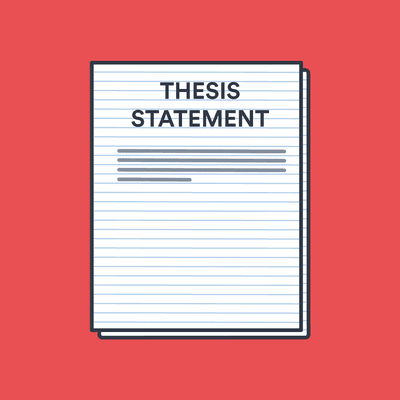
What is the proper length of a thesis statement?
Examples of thesis statements, frequently asked questions about the length of thesis statements, related articles.
If you find yourself in the process of writing a thesis statement but you don't know how long it should be, you've come to right place. In the next paragraphs you will learn about the most efficient way to write a thesis statement and how long it should be.
A thesis statement is a concise description of your work’s aim.
The short answer is: one or two sentences. The more i n-depth answer: as your writing evolves, and as you write longer papers, your thesis statement will typically be at least two, and often more, sentences. The thesis of a scholarly article may have three or four long sentences.
The point is to write a well-formed statement that clearly sets out the argument and aim of your research. A one sentence thesis is fine for shorter papers, but make sure it's a full, concrete statement. Longer thesis statements should follow the same rule; be sure that your statement includes essential information and resist too much exposition.
Here are some basic rules for thesis statement lengths based on the number of pages:
- 5 pages : 1 sentence
- 5-8 pages : 1 or 2 sentences
- 8-13 pages : 2 or 3 sentences
- 13-23 pages : 3 or 4 sentences
- Over 23 pages : a few sentences or a paragraph
Joe Haley, a former writing instructor at Johns Hopkins University exemplified in this forum post the different sizes a thesis statement can take. For a paper on Jane Austen's Pride and Prejudice, someone could come up with these two theses:
In Jane Austen's Pride and Prejudice , gossip is an important but morally ambiguous tool for shaping characters' opinions of each other.
As the aforementioned critics have noted, the prevalence of gossip in Jane Austen's oeuvre does indeed reflect the growing prominence of an explicitly-delineated private sphere in nineteenth-century British society. However, in contrast with these critics' general conclusions about Austen and class, which tend to identify her authorial voice directly with the bourgeois mores shaping her appropriation of the bildungsroman, the ambiguity of this communicative mode in Pride and Prejudice suggests that when writing at the height of her authorial powers, at least, Austen is capable of skepticism and even self-critique. For what is the narrator of her most celebrated novel if not its arch-gossip par excellence ?
Both statements are equally sound, but the second example clearly belongs in a longer paper. In the end, the length of your thesis statement will depend on the scope of your work.
There is no exact word count for a thesis statement, since the length depends on your level of knowledge and expertise. A two sentence thesis statement would be between 20-50 words.
The length of the work will determine how long your thesis statement is. A concise thesis is typically between 20-50 words. A paragraph is also acceptable for a thesis statement; however, anything over one paragraph is probably too long.
Here is a list of Thesis Statement Examples that will help you understand better how long they can be.
As a high school student, you are not expected to have an elaborate thesis statement. A couple of clear sentences indicating the aim of your essay will be more than enough.
Here is a YouTube tutorial that will help you write a thesis statement: How To Write An Essay: Thesis Statements by Ariel Bisset.


Thesis Statements
What this handout is about.
This handout describes what a thesis statement is, how thesis statements work in your writing, and how you can craft or refine one for your draft.
Introduction
Writing in college often takes the form of persuasion—convincing others that you have an interesting, logical point of view on the subject you are studying. Persuasion is a skill you practice regularly in your daily life. You persuade your roommate to clean up, your parents to let you borrow the car, your friend to vote for your favorite candidate or policy. In college, course assignments often ask you to make a persuasive case in writing. You are asked to convince your reader of your point of view. This form of persuasion, often called academic argument, follows a predictable pattern in writing. After a brief introduction of your topic, you state your point of view on the topic directly and often in one sentence. This sentence is the thesis statement, and it serves as a summary of the argument you’ll make in the rest of your paper.
What is a thesis statement?
A thesis statement:
- tells the reader how you will interpret the significance of the subject matter under discussion.
- is a road map for the paper; in other words, it tells the reader what to expect from the rest of the paper.
- directly answers the question asked of you. A thesis is an interpretation of a question or subject, not the subject itself. The subject, or topic, of an essay might be World War II or Moby Dick; a thesis must then offer a way to understand the war or the novel.
- makes a claim that others might dispute.
- is usually a single sentence near the beginning of your paper (most often, at the end of the first paragraph) that presents your argument to the reader. The rest of the paper, the body of the essay, gathers and organizes evidence that will persuade the reader of the logic of your interpretation.
If your assignment asks you to take a position or develop a claim about a subject, you may need to convey that position or claim in a thesis statement near the beginning of your draft. The assignment may not explicitly state that you need a thesis statement because your instructor may assume you will include one. When in doubt, ask your instructor if the assignment requires a thesis statement. When an assignment asks you to analyze, to interpret, to compare and contrast, to demonstrate cause and effect, or to take a stand on an issue, it is likely that you are being asked to develop a thesis and to support it persuasively. (Check out our handout on understanding assignments for more information.)
How do I create a thesis?
A thesis is the result of a lengthy thinking process. Formulating a thesis is not the first thing you do after reading an essay assignment. Before you develop an argument on any topic, you have to collect and organize evidence, look for possible relationships between known facts (such as surprising contrasts or similarities), and think about the significance of these relationships. Once you do this thinking, you will probably have a “working thesis” that presents a basic or main idea and an argument that you think you can support with evidence. Both the argument and your thesis are likely to need adjustment along the way.
Writers use all kinds of techniques to stimulate their thinking and to help them clarify relationships or comprehend the broader significance of a topic and arrive at a thesis statement. For more ideas on how to get started, see our handout on brainstorming .
How do I know if my thesis is strong?
If there’s time, run it by your instructor or make an appointment at the Writing Center to get some feedback. Even if you do not have time to get advice elsewhere, you can do some thesis evaluation of your own. When reviewing your first draft and its working thesis, ask yourself the following :
- Do I answer the question? Re-reading the question prompt after constructing a working thesis can help you fix an argument that misses the focus of the question. If the prompt isn’t phrased as a question, try to rephrase it. For example, “Discuss the effect of X on Y” can be rephrased as “What is the effect of X on Y?”
- Have I taken a position that others might challenge or oppose? If your thesis simply states facts that no one would, or even could, disagree with, it’s possible that you are simply providing a summary, rather than making an argument.
- Is my thesis statement specific enough? Thesis statements that are too vague often do not have a strong argument. If your thesis contains words like “good” or “successful,” see if you could be more specific: why is something “good”; what specifically makes something “successful”?
- Does my thesis pass the “So what?” test? If a reader’s first response is likely to be “So what?” then you need to clarify, to forge a relationship, or to connect to a larger issue.
- Does my essay support my thesis specifically and without wandering? If your thesis and the body of your essay do not seem to go together, one of them has to change. It’s okay to change your working thesis to reflect things you have figured out in the course of writing your paper. Remember, always reassess and revise your writing as necessary.
- Does my thesis pass the “how and why?” test? If a reader’s first response is “how?” or “why?” your thesis may be too open-ended and lack guidance for the reader. See what you can add to give the reader a better take on your position right from the beginning.
Suppose you are taking a course on contemporary communication, and the instructor hands out the following essay assignment: “Discuss the impact of social media on public awareness.” Looking back at your notes, you might start with this working thesis:
Social media impacts public awareness in both positive and negative ways.
You can use the questions above to help you revise this general statement into a stronger thesis.
- Do I answer the question? You can analyze this if you rephrase “discuss the impact” as “what is the impact?” This way, you can see that you’ve answered the question only very generally with the vague “positive and negative ways.”
- Have I taken a position that others might challenge or oppose? Not likely. Only people who maintain that social media has a solely positive or solely negative impact could disagree.
- Is my thesis statement specific enough? No. What are the positive effects? What are the negative effects?
- Does my thesis pass the “how and why?” test? No. Why are they positive? How are they positive? What are their causes? Why are they negative? How are they negative? What are their causes?
- Does my thesis pass the “So what?” test? No. Why should anyone care about the positive and/or negative impact of social media?
After thinking about your answers to these questions, you decide to focus on the one impact you feel strongly about and have strong evidence for:
Because not every voice on social media is reliable, people have become much more critical consumers of information, and thus, more informed voters.
This version is a much stronger thesis! It answers the question, takes a specific position that others can challenge, and it gives a sense of why it matters.
Let’s try another. Suppose your literature professor hands out the following assignment in a class on the American novel: Write an analysis of some aspect of Mark Twain’s novel Huckleberry Finn. “This will be easy,” you think. “I loved Huckleberry Finn!” You grab a pad of paper and write:
Mark Twain’s Huckleberry Finn is a great American novel.
You begin to analyze your thesis:
- Do I answer the question? No. The prompt asks you to analyze some aspect of the novel. Your working thesis is a statement of general appreciation for the entire novel.
Think about aspects of the novel that are important to its structure or meaning—for example, the role of storytelling, the contrasting scenes between the shore and the river, or the relationships between adults and children. Now you write:
In Huckleberry Finn, Mark Twain develops a contrast between life on the river and life on the shore.
- Do I answer the question? Yes!
- Have I taken a position that others might challenge or oppose? Not really. This contrast is well-known and accepted.
- Is my thesis statement specific enough? It’s getting there–you have highlighted an important aspect of the novel for investigation. However, it’s still not clear what your analysis will reveal.
- Does my thesis pass the “how and why?” test? Not yet. Compare scenes from the book and see what you discover. Free write, make lists, jot down Huck’s actions and reactions and anything else that seems interesting.
- Does my thesis pass the “So what?” test? What’s the point of this contrast? What does it signify?”
After examining the evidence and considering your own insights, you write:
Through its contrasting river and shore scenes, Twain’s Huckleberry Finn suggests that to find the true expression of American democratic ideals, one must leave “civilized” society and go back to nature.
This final thesis statement presents an interpretation of a literary work based on an analysis of its content. Of course, for the essay itself to be successful, you must now present evidence from the novel that will convince the reader of your interpretation.
Works consulted
We consulted these works while writing this handout. This is not a comprehensive list of resources on the handout’s topic, and we encourage you to do your own research to find additional publications. Please do not use this list as a model for the format of your own reference list, as it may not match the citation style you are using. For guidance on formatting citations, please see the UNC Libraries citation tutorial . We revise these tips periodically and welcome feedback.
Anson, Chris M., and Robert A. Schwegler. 2010. The Longman Handbook for Writers and Readers , 6th ed. New York: Longman.
Lunsford, Andrea A. 2015. The St. Martin’s Handbook , 8th ed. Boston: Bedford/St Martin’s.
Ramage, John D., John C. Bean, and June Johnson. 2018. The Allyn & Bacon Guide to Writing , 8th ed. New York: Pearson.
Ruszkiewicz, John J., Christy Friend, Daniel Seward, and Maxine Hairston. 2010. The Scott, Foresman Handbook for Writers , 9th ed. Boston: Pearson Education.
You may reproduce it for non-commercial use if you use the entire handout and attribute the source: The Writing Center, University of North Carolina at Chapel Hill
Make a Gift
Have a language expert improve your writing
Run a free plagiarism check in 10 minutes, automatically generate references for free.
- Knowledge Base
- Dissertation
- What Is a Thesis? | Ultimate Guide & Examples
What Is a Thesis? | Ultimate Guide & Examples
Published on 15 September 2022 by Tegan George . Revised on 5 December 2023.
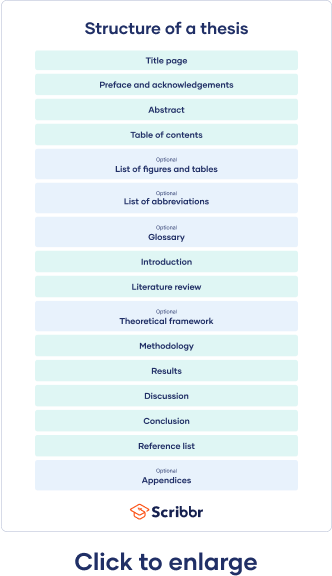
A thesis is a type of research paper based on your original research. It is usually submitted as the final step of a PhD program in the UK.
Writing a thesis can be a daunting experience. Indeed, alongside a dissertation , it is the longest piece of writing students typically complete. It relies on your ability to conduct research from start to finish: designing your research , collecting data , developing a robust analysis, drawing strong conclusions , and writing concisely .
Thesis template
You can also download our full thesis template in the format of your choice below. Our template includes a ready-made table of contents , as well as guidance for what each chapter should include. It’s easy to make it your own, and can help you get started.
Download Word template Download Google Docs template
Instantly correct all language mistakes in your text
Be assured that you'll submit flawless writing. Upload your document to correct all your mistakes.

Table of contents
Thesis vs. thesis statement, how to structure a thesis, acknowledgements or preface, list of figures and tables, list of abbreviations, introduction, literature review, methodology, reference list, proofreading and editing, defending your thesis, frequently asked questions about theses.
You may have heard the word thesis as a standalone term or as a component of academic writing called a thesis statement . Keep in mind that these are two very different things.
- A thesis statement is a very common component of an essay, particularly in the humanities. It usually comprises 1 or 2 sentences in the introduction of your essay , and should clearly and concisely summarise the central points of your academic essay .
- A thesis is a long-form piece of academic writing, often taking more than a full semester to complete. It is generally a degree requirement to complete a PhD program.
- In many countries, particularly the UK, a dissertation is generally written at the bachelor’s or master’s level.
- In the US, a dissertation is generally written as a final step toward obtaining a PhD.
Prevent plagiarism, run a free check.
The final structure of your thesis depends on a variety of components, such as:
- Your discipline
- Your theoretical approach
Humanities theses are often structured more like a longer-form essay . Just like in an essay, you build an argument to support a central thesis.
In both hard and social sciences, theses typically include an introduction , literature review , methodology section , results section , discussion section , and conclusion section . These are each presented in their own dedicated section or chapter. In some cases, you might want to add an appendix .
Thesis examples
We’ve compiled a short list of thesis examples to help you get started.
- Example thesis #1: ‘Abolition, Africans, and Abstraction: the Influence of the “Noble Savage” on British and French Antislavery Thought, 1787-1807’ by Suchait Kahlon.
- Example thesis #2: ‘”A Starving Man Helping Another Starving Man”: UNRRA, India, and the Genesis of Global Relief, 1943-1947’ by Julian Saint Reiman.
The very first page of your thesis contains all necessary identifying information, including:
- Your full title
- Your full name
- Your department
- Your institution and degree program
- Your submission date.
Sometimes the title page also includes your student ID, the name of your supervisor, or the university’s logo. Check out your university’s guidelines if you’re not sure.
Read more about title pages
The acknowledgements section is usually optional. Its main point is to allow you to thank everyone who helped you in your thesis journey, such as supervisors, friends, or family. You can also choose to write a preface , but it’s typically one or the other, not both.
Read more about acknowledgements Read more about prefaces
An abstract is a short summary of your thesis. Usually a maximum of 300 words long, it’s should include brief descriptions of your research objectives , methods, results, and conclusions. Though it may seem short, it introduces your work to your audience, serving as a first impression of your thesis.
Read more about abstracts
A table of contents lists all of your sections, plus their corresponding page numbers and subheadings if you have them. This helps your reader seamlessly navigate your document.
Your table of contents should include all the major parts of your thesis. In particular, don’t forget the the appendices. If you used heading styles, it’s easy to generate an automatic table Microsoft Word.
Read more about tables of contents
While not mandatory, if you used a lot of tables and/or figures, it’s nice to include a list of them to help guide your reader. It’s also easy to generate one of these in Word: just use the ‘Insert Caption’ feature.
Read more about lists of figures and tables
If you have used a lot of industry- or field-specific abbreviations in your thesis, you should include them in an alphabetised list of abbreviations . This way, your readers can easily look up any meanings they aren’t familiar with.
Read more about lists of abbreviations
Relatedly, if you find yourself using a lot of very specialised or field-specific terms that may not be familiar to your reader, consider including a glossary . Alphabetise the terms you want to include with a brief definition.
Read more about glossaries
An introduction sets up the topic, purpose, and relevance of your thesis, as well as expectations for your reader. This should:
- Ground your research topic , sharing any background information your reader may need
- Define the scope of your work
- Introduce any existing research on your topic, situating your work within a broader problem or debate
- State your research question(s)
- Outline (briefly) how the remainder of your work will proceed
In other words, your introduction should clearly and concisely show your reader the “what, why, and how” of your research.
Read more about introductions
A literature review helps you gain a robust understanding of any extant academic work on your topic, encompassing:
- Selecting relevant sources
- Determining the credibility of your sources
- Critically evaluating each of your sources
- Drawing connections between sources, including any themes, patterns, conflicts, or gaps
A literature review is not merely a summary of existing work. Rather, your literature review should ultimately lead to a clear justification for your own research, perhaps via:
- Addressing a gap in the literature
- Building on existing knowledge to draw new conclusions
- Exploring a new theoretical or methodological approach
- Introducing a new solution to an unresolved problem
- Definitively advocating for one side of a theoretical debate
Read more about literature reviews
Theoretical framework
Your literature review can often form the basis for your theoretical framework, but these are not the same thing. A theoretical framework defines and analyses the concepts and theories that your research hinges on.
Read more about theoretical frameworks
Your methodology chapter shows your reader how you conducted your research. It should be written clearly and methodically, easily allowing your reader to critically assess the credibility of your argument. Furthermore, your methods section should convince your reader that your method was the best way to answer your research question.
A methodology section should generally include:
- Your overall approach ( quantitative vs. qualitative )
- Your research methods (e.g., a longitudinal study )
- Your data collection methods (e.g., interviews or a controlled experiment
- Any tools or materials you used (e.g., computer software)
- The data analysis methods you chose (e.g., statistical analysis , discourse analysis )
- A strong, but not defensive justification of your methods
Read more about methodology sections
Your results section should highlight what your methodology discovered. These two sections work in tandem, but shouldn’t repeat each other. While your results section can include hypotheses or themes, don’t include any speculation or new arguments here.
Your results section should:
- State each (relevant) result with any (relevant) descriptive statistics (e.g., mean , standard deviation ) and inferential statistics (e.g., test statistics , p values )
- Explain how each result relates to the research question
- Determine whether the hypothesis was supported
Additional data (like raw numbers or interview transcripts ) can be included as an appendix . You can include tables and figures, but only if they help the reader better understand your results.
Read more about results sections
Your discussion section is where you can interpret your results in detail. Did they meet your expectations? How well do they fit within the framework that you built? You can refer back to any relevant source material to situate your results within your field, but leave most of that analysis in your literature review.
For any unexpected results, offer explanations or alternative interpretations of your data.
Read more about discussion sections
Your thesis conclusion should concisely answer your main research question. It should leave your reader with an ultra-clear understanding of your central argument, and emphasise what your research specifically has contributed to your field.
Why does your research matter? What recommendations for future research do you have? Lastly, wrap up your work with any concluding remarks.
Read more about conclusions
In order to avoid plagiarism , don’t forget to include a full reference list at the end of your thesis, citing the sources that you used. Choose one citation style and follow it consistently throughout your thesis, taking note of the formatting requirements of each style.
Which style you choose is often set by your department or your field, but common styles include MLA , Chicago , and APA.
Create APA citations Create MLA citations
In order to stay clear and concise, your thesis should include the most essential information needed to answer your research question. However, chances are you have many contributing documents, like interview transcripts or survey questions . These can be added as appendices , to save space in the main body.
Read more about appendices
Once you’re done writing, the next part of your editing process begins. Leave plenty of time for proofreading and editing prior to submission. Nothing looks worse than grammar mistakes or sloppy spelling errors!
Consider using a professional thesis editing service to make sure your final project is perfect.
Once you’ve submitted your final product, it’s common practice to have a thesis defense, an oral component of your finished work. This is scheduled by your advisor or committee, and usually entails a presentation and Q&A session.
After your defense, your committee will meet to determine if you deserve any departmental honors or accolades. However, keep in mind that defenses are usually just a formality. If there are any serious issues with your work, these should be resolved with your advisor way before a defense.
The conclusion of your thesis or dissertation shouldn’t take up more than 5-7% of your overall word count.
When you mention different chapters within your text, it’s considered best to use Roman numerals for most citation styles. However, the most important thing here is to remain consistent whenever using numbers in your dissertation .
If you only used a few abbreviations in your thesis or dissertation, you don’t necessarily need to include a list of abbreviations .
If your abbreviations are numerous, or if you think they won’t be known to your audience, it’s never a bad idea to add one. They can also improve readability, minimising confusion about abbreviations unfamiliar to your reader.
A thesis or dissertation outline is one of the most critical first steps in your writing process. It helps you to lay out and organise your ideas and can provide you with a roadmap for deciding what kind of research you’d like to undertake.
Generally, an outline contains information on the different sections included in your thesis or dissertation, such as:
- Your anticipated title
- Your abstract
- Your chapters (sometimes subdivided into further topics like literature review, research methods, avenues for future research, etc.)
Cite this Scribbr article
If you want to cite this source, you can copy and paste the citation or click the ‘Cite this Scribbr article’ button to automatically add the citation to our free Reference Generator.
George, T. (2023, December 05). What Is a Thesis? | Ultimate Guide & Examples. Scribbr. Retrieved 6 May 2024, from https://www.scribbr.co.uk/thesis-dissertation/thesis-ultimate-guide/
Is this article helpful?
Tegan George
Other students also liked, dissertation & thesis outline | example & free templates, how to write a thesis or dissertation conclusion, how to write a thesis or dissertation introduction.

- Walden University
- Faculty Portal
Writing a Paper: Thesis Statements
Basics of thesis statements.
The thesis statement is the brief articulation of your paper's central argument and purpose. You might hear it referred to as simply a "thesis." Every scholarly paper should have a thesis statement, and strong thesis statements are concise, specific, and arguable. Concise means the thesis is short: perhaps one or two sentences for a shorter paper. Specific means the thesis deals with a narrow and focused topic, appropriate to the paper's length. Arguable means that a scholar in your field could disagree (or perhaps already has!).
Strong thesis statements address specific intellectual questions, have clear positions, and use a structure that reflects the overall structure of the paper. Read on to learn more about constructing a strong thesis statement.
Being Specific
This thesis statement has no specific argument:
Needs Improvement: In this essay, I will examine two scholarly articles to find similarities and differences.
This statement is concise, but it is neither specific nor arguable—a reader might wonder, "Which scholarly articles? What is the topic of this paper? What field is the author writing in?" Additionally, the purpose of the paper—to "examine…to find similarities and differences" is not of a scholarly level. Identifying similarities and differences is a good first step, but strong academic argument goes further, analyzing what those similarities and differences might mean or imply.
Better: In this essay, I will argue that Bowler's (2003) autocratic management style, when coupled with Smith's (2007) theory of social cognition, can reduce the expenses associated with employee turnover.
The new revision here is still concise, as well as specific and arguable. We can see that it is specific because the writer is mentioning (a) concrete ideas and (b) exact authors. We can also gather the field (business) and the topic (management and employee turnover). The statement is arguable because the student goes beyond merely comparing; he or she draws conclusions from that comparison ("can reduce the expenses associated with employee turnover").
Making a Unique Argument
This thesis draft repeats the language of the writing prompt without making a unique argument:
Needs Improvement: The purpose of this essay is to monitor, assess, and evaluate an educational program for its strengths and weaknesses. Then, I will provide suggestions for improvement.
You can see here that the student has simply stated the paper's assignment, without articulating specifically how he or she will address it. The student can correct this error simply by phrasing the thesis statement as a specific answer to the assignment prompt.
Better: Through a series of student interviews, I found that Kennedy High School's antibullying program was ineffective. In order to address issues of conflict between students, I argue that Kennedy High School should embrace policies outlined by the California Department of Education (2010).
Words like "ineffective" and "argue" show here that the student has clearly thought through the assignment and analyzed the material; he or she is putting forth a specific and debatable position. The concrete information ("student interviews," "antibullying") further prepares the reader for the body of the paper and demonstrates how the student has addressed the assignment prompt without just restating that language.
Creating a Debate
This thesis statement includes only obvious fact or plot summary instead of argument:
Needs Improvement: Leadership is an important quality in nurse educators.
A good strategy to determine if your thesis statement is too broad (and therefore, not arguable) is to ask yourself, "Would a scholar in my field disagree with this point?" Here, we can see easily that no scholar is likely to argue that leadership is an unimportant quality in nurse educators. The student needs to come up with a more arguable claim, and probably a narrower one; remember that a short paper needs a more focused topic than a dissertation.
Better: Roderick's (2009) theory of participatory leadership is particularly appropriate to nurse educators working within the emergency medicine field, where students benefit most from collegial and kinesthetic learning.
Here, the student has identified a particular type of leadership ("participatory leadership"), narrowing the topic, and has made an arguable claim (this type of leadership is "appropriate" to a specific type of nurse educator). Conceivably, a scholar in the nursing field might disagree with this approach. The student's paper can now proceed, providing specific pieces of evidence to support the arguable central claim.
Choosing the Right Words
This thesis statement uses large or scholarly-sounding words that have no real substance:
Needs Improvement: Scholars should work to seize metacognitive outcomes by harnessing discipline-based networks to empower collaborative infrastructures.
There are many words in this sentence that may be buzzwords in the student's field or key terms taken from other texts, but together they do not communicate a clear, specific meaning. Sometimes students think scholarly writing means constructing complex sentences using special language, but actually it's usually a stronger choice to write clear, simple sentences. When in doubt, remember that your ideas should be complex, not your sentence structure.
Better: Ecologists should work to educate the U.S. public on conservation methods by making use of local and national green organizations to create a widespread communication plan.
Notice in the revision that the field is now clear (ecology), and the language has been made much more field-specific ("conservation methods," "green organizations"), so the reader is able to see concretely the ideas the student is communicating.
Leaving Room for Discussion
This thesis statement is not capable of development or advancement in the paper:
Needs Improvement: There are always alternatives to illegal drug use.
This sample thesis statement makes a claim, but it is not a claim that will sustain extended discussion. This claim is the type of claim that might be appropriate for the conclusion of a paper, but in the beginning of the paper, the student is left with nowhere to go. What further points can be made? If there are "always alternatives" to the problem the student is identifying, then why bother developing a paper around that claim? Ideally, a thesis statement should be complex enough to explore over the length of the entire paper.
Better: The most effective treatment plan for methamphetamine addiction may be a combination of pharmacological and cognitive therapy, as argued by Baker (2008), Smith (2009), and Xavier (2011).
In the revised thesis, you can see the student make a specific, debatable claim that has the potential to generate several pages' worth of discussion. When drafting a thesis statement, think about the questions your thesis statement will generate: What follow-up inquiries might a reader have? In the first example, there are almost no additional questions implied, but the revised example allows for a good deal more exploration.
Thesis Mad Libs
If you are having trouble getting started, try using the models below to generate a rough model of a thesis statement! These models are intended for drafting purposes only and should not appear in your final work.
- In this essay, I argue ____, using ______ to assert _____.
- While scholars have often argued ______, I argue______, because_______.
- Through an analysis of ______, I argue ______, which is important because_______.
Words to Avoid and to Embrace
When drafting your thesis statement, avoid words like explore, investigate, learn, compile, summarize , and explain to describe the main purpose of your paper. These words imply a paper that summarizes or "reports," rather than synthesizing and analyzing.
Instead of the terms above, try words like argue, critique, question , and interrogate . These more analytical words may help you begin strongly, by articulating a specific, critical, scholarly position.
Read Kayla's blog post for tips on taking a stand in a well-crafted thesis statement.
Related Resources
Didn't find what you need? Email us at [email protected] .
- Previous Page: Introductions
- Next Page: Conclusions
- Office of Student Disability Services
Walden Resources
Departments.
- Academic Residencies
- Academic Skills
- Career Planning and Development
- Customer Care Team
- Field Experience
- Military Services
- Student Success Advising
- Writing Skills
Centers and Offices
- Center for Social Change
- Office of Academic Support and Instructional Services
- Office of Degree Acceleration
- Office of Research and Doctoral Services
- Office of Student Affairs
Student Resources
- Doctoral Writing Assessment
- Form & Style Review
- Quick Answers
- ScholarWorks
- SKIL Courses and Workshops
- Walden Bookstore
- Walden Catalog & Student Handbook
- Student Safety/Title IX
- Legal & Consumer Information
- Website Terms and Conditions
- Cookie Policy
- Accessibility
- Accreditation
- State Authorization
- Net Price Calculator
- Contact Walden
Walden University is a member of Adtalem Global Education, Inc. www.adtalem.com Walden University is certified to operate by SCHEV © 2024 Walden University LLC. All rights reserved.
Purdue Online Writing Lab Purdue OWL® College of Liberal Arts
Welcome to the Purdue Online Writing Lab

Welcome to the Purdue OWL
This page is brought to you by the OWL at Purdue University. When printing this page, you must include the entire legal notice.
Copyright ©1995-2018 by The Writing Lab & The OWL at Purdue and Purdue University. All rights reserved. This material may not be published, reproduced, broadcast, rewritten, or redistributed without permission. Use of this site constitutes acceptance of our terms and conditions of fair use.
The Online Writing Lab at Purdue University houses writing resources and instructional material, and we provide these as a free service of the Writing Lab at Purdue. Students, members of the community, and users worldwide will find information to assist with many writing projects. Teachers and trainers may use this material for in-class and out-of-class instruction.
The Purdue On-Campus Writing Lab and Purdue Online Writing Lab assist clients in their development as writers—no matter what their skill level—with on-campus consultations, online participation, and community engagement. The Purdue Writing Lab serves the Purdue, West Lafayette, campus and coordinates with local literacy initiatives. The Purdue OWL offers global support through online reference materials and services.
A Message From the Assistant Director of Content Development
The Purdue OWL® is committed to supporting students, instructors, and writers by offering a wide range of resources that are developed and revised with them in mind. To do this, the OWL team is always exploring possibilties for a better design, allowing accessibility and user experience to guide our process. As the OWL undergoes some changes, we welcome your feedback and suggestions by email at any time.
Please don't hesitate to contact us via our contact page if you have any questions or comments.
All the best,
Social Media
Facebook twitter.
Search form

The Senior Thesis at 100: Back to the Future
Photo: Sameer A. Khan h’21

As Princeton marks the 100th anniversary of the senior thesis, what anchors one of the University’s most revered — and arguably, most daunting — traditions is the belief that each and every student can surprise themselves if given the chance. Patricia Fernández-Kelly, who has taught sociology at the University since 1997, is one member of this thought camp. Having advised upward of 80 theses, one of Princeton’s most prolific thesis advisers claims “that a senior thesis does fulfill an extraordinary purpose.” It allows students, she says, “to discover things that they never thought that they’d discover.”
Discovery comes in many forms. Most of the time, it is a personal affair, a point of growth. On the rare occasion, it might make headlines. In early 2023, Edward Tian ’23 was in the news after launching an AI-detecting application derived from his thesis-in-progress. GPTZero, a tool that discerns whether a text was produced by ChatGPT based on its “burstiness,” or the degree to which its language and sentence structures are unpredictable to machines, was viewed by a quarter of a million people within its first 20 days on the internet, according to Tian.
Tian, a B.S.E. graduate of Princeton’s computer science department, didn’t have to write a thesis. (The thesis is mandatory for all seniors except those pursuing B.S.E. degrees in computer science, mechanical and aerospace engineering, and operations research and financial engineering.) But his interest in writing and journalism pushed him to produce something public facing. “There’s a lot of worlds colliding where the work needs to be done,” says Tian, who had spent a year between his sophomore and junior years with the BBC using data tools to investigate misinformation. When he told his former professor John McPhee ’53 — whose sentences Tian fed into GPTZero to demonstrate how the tool worked — about what he had accomplished, McPhee’s exhortation was surely and unsurprisingly “bursty,” Tian recalls: “He said, ‘Go dazzle the cyberzone.’”
It’s exactly the kind of thing any undergraduate would want to hear as they launch themselves into the rest of their lives. Because the Princeton senior thesis is no mean feat — nor is it a static event. Eleven years ago, PAW published a retrospective of the tradition with testimonies from a range of alumni. But with the advent of AI technologies and the coronavirus pandemic, the decade since has already pushed the thesis beyond what it has historically been. And what it has been is a blueprint for a young person coming of age in their intellectual and creative journey; an example of the extraordinary things Princeton students can do, given the right support; and an exercise requiring focus, persistence, and a dash of good humor, virtues that feel more timeless now that a hundred years have passed.

A NEW TRADITION
In recent years, students have started taking photographs with their senior thesis in front of nassau hall. these alumni shared their photos with paw. .
1. Camden Olson ’19, “Service Dog Tales: A Tri-fold Study Investigating Diabetic Alert Dog Accuracy, the Use of Animal-Assisted Therapy to Address Executive Functioning Skills, and the Function of Calming Signals in Service Dog Puppies”; 2. Evan Saitta ’14, “Paleobiology of North American stegosaurs: Evidence for sexual dimorphism”; 3. Zhan Okuda-Lim ’15, “Early to Rise? The Influence of School Start Times on Adolescent Student Achievement in the Clark County School District, Nevada”; 4. Connor Pfeiffer ’18, “Britain and the ‘German Revolution’: The European System and British Foreign Policy During the Franco-Prussian War”; 5. Brandon McGhee ’18, “The Blacker the Berry: The Black Church, Linked Fate, Marginalization, and the Electability of Black Candidates”; 6. Jimin Kang ’21, “Tales from Indigenous Brazil: A Translation of Daniel Munduruku’s Chronicles of São Paulo & The Lessons I’ve Learned from the Portuguese”; 7. Victoria Pan ’21, “Are Lockdown Orders Driving Job Loss? Characterizing Labor Market Weakness During the COVID-19 Recession”; 8. Daniella Cohen ’22, “Inter-Subject Correlation Analysis Reveals Distinct Brain Network Configurations for Naturalistic Educational Stimuli”; 9. Juliana DaSilva ’23, “Investigating the role of Hh signaling during embryonic germ cell migration in Drosophila melanogaster”; 10. Devin Kilpatrick ’19, “Sojourners from Central America: A Study of Contemporary Migrants & Migration from Guatemala to the United States”; 11. Alice Xu ’20, “Pretty, and The Promises and Compromises of Happiness: Idealism, Realism, and Choice in Jane Austen’s Novels.”
The idea for the senior thesis was born in the immediate aftermath of World War I when Luther Pfahler Eisenhart, an effervescent math professor who quickly rose through the ranks to become Princeton’s dean of the faculty, proposed slashing the traditional five courses in an undergraduate curriculum to four. The resultant free time would go toward independent study of the student’s choosing, a policy that, at most other schools, had only ever been reserved for those seeking honors. (To this day, the pattern holds: Though some seniors at other U.S. universities write theses, the task is optional for those hoping to graduate with extra laurels.)
With the pedagogical magnanimity that Eisenhart was known for, he fervently believed that grades achieved in the first two years of one’s time at Princeton “did not constitute a reliable test of a student’s ability to qualify for honors,” writes Alexander Leitch 1924 in A Princeton Companion . Rather, only when given the chance to “function freely” on their own would students prove their academic mettle.
It is this sense of possibility that renders the thesis a subject of enduring fascination for generations of alumni. Testimonies of the thesis-writing experience abound, both online and elsewhere: in the archives of this very magazine; the dozens of reflections collected in Nancy Weiss Malkiel’s 2007 anthology The Thesis: Quintessentially Princeton ; on bookcases across campus but most notably in the Mudd Manuscript Library, where thousands of theses — especially those submitted prior to the digitization of theses in 2013 — are kept.

Then there are the senior theses about the senior thesis. Most readers of this article will open the work of Melissa Gracey DeMontrond ’00 to find themselves in the dedication. “First and foremost,” it begins, “I would like to dedicate this thesis to every individual who has ever gone through the torturous and merciless process of writing a senior thesis at Princeton University. I know your pain.” A handful might even find themselves in DeMontrond’s photographs of seniors burrowed away in Firestone’s metal carrels, metallic 3-by-8 boxes that thesis writers used as a kind of office, or in the stories of “cubby hole parties” that took place among these carrels, which Kelly Ehrhart ’97 describes in her own thesis about the thesis. (The carrels were removed in 2012, except for three that have been preserved in Firestone Library. By the time I arrived at Princeton, one couldn’t hide behind a sliding door, but they could overhear other people’s conversations on the other side of the open-air carrels.)

Both DeMontrond and Ehrhart were anthropology majors fascinated by the thesis as a rite of passage. How a student might enter Princeton as a child but emerge, after being shepherded through a series of challenges within a community of like-minded peers, a worldly adult. “The thesis process has altered my state in the world and made me aware of what is to come in the way of responsibility and behavior,” Ehrhart writes in her conclusion. “However much it is complained about and however despised it may be, the thesis is one of the most integral events that I will ever endure.”
It’s true: The thesis calls upon young people for an ingenuity that emerges from no source but themselves. Often, the results become astounding contributions to society. The list and lore of “famous theses” are well-known: John C. Bogle ’51 created Vanguard, one of the world’s largest providers of mutual funds, from his thesis; Wendy Kopp ’89, Teach for America, which has impacted more than 5 million students across the United States; Jonathan Safran Foer ’99, his first novel, Everything Is Illuminated , which was adapted into a 2005 film and launched his writing career.

There are dozens of other examples besides. One of the lesser known is how Elizabeth Chai Vasarhelyi ’00 — whose 2023 biopic Nyad was nominated for two Oscars — launched her filmmaking career with a documentary she made in Kosovo to fulfill part of her thesis requirement in comparative literature.
Co-directed with Hugo Berkeley ’99, A Normal Life , which follows a group of five remarkable young people building their lives under the shadow of war, won best documentary at the Tribeca Film Festival in 2003. Fifteen years later, Vasarhelyi and her partner, Jimmy Chin, won an Oscar for their nail-biting documentary Free Solo , which follows professional climber Alex Honnold as he climbs a 3,000-foot-tall summit in California’s Yosemite Valley without any harnesses or ropes.

Vasarhelyi decided to major in comparative literature because of her fascination with “representing the unrepresentable,” she tells PAW. As the child of parents who emigrated from their respective countries due to religious and political persecution, she wanted to explore the tensions between people’s identities and their political contexts. Her project thus became not only her version of film school, but the culmination of four years spent pondering a question that she had really been asking all her life. “Finding the space academically to nurture this curiosity of mine was really meaningful,” she shares. “It defined my whole career. I’ve made films ever since.”
Importantly, most of Princeton’s star-studded theses are works-in-progress that later grow to become much more.
Vasarhelyi edited A Normal Life from her parents’ basement for another two years after graduation. Jordan Salama ’19, whose thesis was the first to become a University Pre-read for incoming freshmen, spent the pandemic rewriting what would become Every Day the River Changes , his nonfiction debut about the communities that live along Colombia’s Magdalena River. Ask him for the full story and you’ll learn that the real work took even longer than that. Salama, a Spanish and Portuguese concentrator, was first inspired to write about the river while pursuing an internship in Colombia after his freshman year. It took multiple returns and the encouragement of his adviser, Christina Lee *99, to create the final submission, which he presented at a fateful journalism colloquium where he was connected to an agent who sent a PDF of Salama’s thesis to some of the nation’s largest publishers.
But trace the story further back, and much like Vasarhelyi’s case, you’ll find that Salama’s story began long, long before he set foot in Old Nassau. Salama’s family is Argentine on his father’s side, and his great-grandfather — the main subject of his most recent book, Stranger in the Desert (2024) — emigrated there from Syria to work as a traveling salesman. Salama only became fluent in Spanish when he came to Princeton, where his experience was one of “opening [his] eyes to Latin America,” he says.
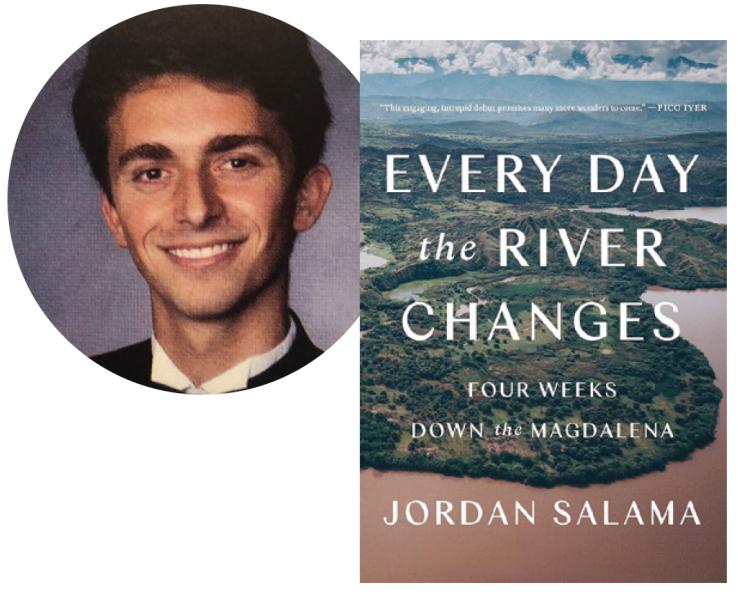
These days, Salama looks back on his Princeton trajectory not only with wonder, but a great deal of humility. “Nobody’s an expert in anything when you’re a senior in college,” he says. And so, throughout the many conversations he shared with strangers and the funny encounters he had — my personal favorite: Salama unexpectedly hearing his rendition of Oasis’ “Wonderwall” played on the sound system in a bar in Puerto Boyacá — he “leaned into it.”
At the end of the day, perhaps that’s what a thesis is: an impressive feat, yes, but also little more than an honest testament to who a young person is and a proof-of-concept for how they mean to go on.
Though all theses are pioneering in their own ways, some are more pioneering than others. Given the immense range of senior theses produced each year, it’s difficult for any single thesis to jump out — or earn a legendary status — as soon as it’s written. But ask any Princeton math major from the past decade about the most fabled thesis they know, and you’ll surely hear about Mason Soun ’15. Inspired by the work of math writer Danica McKellar, Soun wanted a way to explore the trials and tribulations of studying math while championing what inspires people, as he writes in his introduction, “to fall in love with this subject in the first place.”
Combining his passions for math education and creative writing, he went on to produce something exceptional: a thesis composed of comical short stories — featuring fictionalized versions of Justin Bieber, Kim Kardashian, and Kanye West — whose plots revolve around linear algebra and the experience of working with numbers. The first story, “To Beliebe,” follows an earnest and somewhat pitiable version of Bieber as he attempts to become a knife-seller with a company called Vector Marketing.
In one archetypal scene, the Canadian superstar attempts to sell knives — which can be lengthened or fastened together, like vectors — to an old man surnamed Gomez, whose adamant refusal prompts the singer to respond, winking: “Never say never.”
“It was very much an outlier in the math department,” recalls his adviser Jennifer Johnson, who says she enjoyed working with Soun. “He was very serious about the idea of looking for ways to make math less frightening and to share his enthusiasm for mathematics with young students.” (Though it was an “interesting experiment,” she adds, she doesn’t think she “would want to try anything like this again.”)
Sometimes, it is not will but circumstance that calls for seniors to get inventive. Arguably, some of the most exceptional seniors in recent years — and I relinquish any bias — belong to the Class of 2021, who had to evacuate campus just as they were submitting proposals for their senior theses.
Chris Gliwa ’21, a civil and environmental engineering graduate from East Rutherford, New Jersey, had anticipated research at a global scale. Instead, he found himself walking around his neighborhood amid a pandemic that had unexpectedly brought him home.
“It was during these walks that I became more perceptive of the industrial character of my neighborhood,” Gliwa says. In addition to exploring a nearby industrial complex that had once housed a bleachery during the American Civil War, he had socially distanced conversations with elderly neighbors who would share stories about the health problems that had proliferated in the area since the industrial boom in the 1960s. “They said that mysterious illnesses were common, but the companies and local leaders always assured them that there was nothing to worry about.”
Upon scouring a 1980s site assessment and decades-old news articles, Gliwa was compelled by a key culprit: benzene, a highly carcinogenic chemical used in industrial processes. With this discovery, a thesis was born. In the months that followed, Gliwa estimated airborne benzene concentrations using historical site data, then used wind records to build a model demonstrating how benzene would travel into the areas where his neighbors have lived for generations. Though his intention was “not to find conclusive evidence of wrongdoing,” Gliwa explains, his study’s confirmation of environmental pollution in East Rutherford was enough to vindicate his neighbors, whose response made Gliwa “very emotional.”
“They are like family to me,” he reflects, three years on. “People from my community rarely go to schools like Princeton, so to exercise my education and research skills in this way was truly a once-in-a-generation opportunity.”
Though Gliwa chose not to publish his thesis due to the possibility of legal concerns, he continues to build upon the skills that made his project possible with a long view toward tangible policy change. These days, he is fulfilling his third year as part of the University’s Scholars in the Nation’s Service Initiative (SINSI). His first rotation was with a team working on climate and environmental issues at the White House.
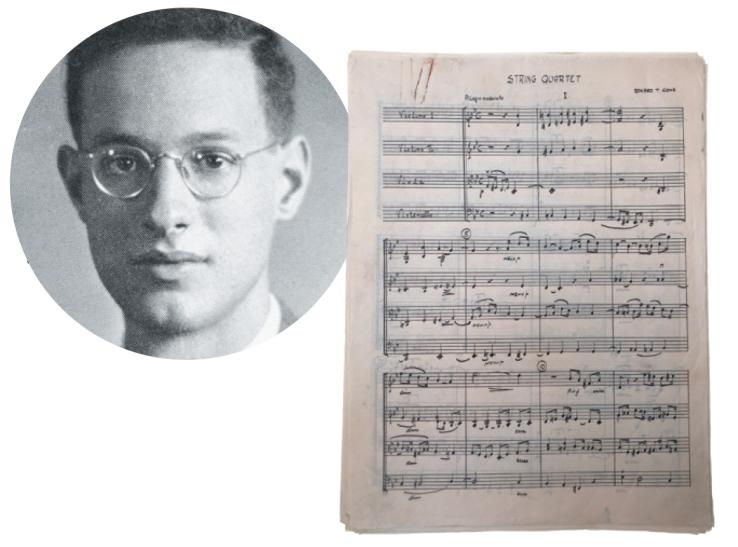
Despite its reputational charge, the senior thesis isn’t immune to change. (Nor is it immune to critique: In the 1990s, a debate on its potential abolition made it to The New York Times .) As each generation of Princetonians paints new strokes on the hallowed portrait of this timeless tradition, the University has had to reframe the assignment. Creative theses — in which seniors produce novels, films, plays, and dance performances, among other things — are a fantastic case in point. Since Edward T. Cone ’39 submitted the first creative thesis in the form of a self-composed string quartet, hundreds of Princetonians have followed suit, giving rise to “hybrid” theses in which students (in certain majors such as English and comparative literature) fulfill their thesis requirement with a creative project supplemented by a critical essay. Online records of creative writing submissions since 1995 document a rising trend: Since 2013, there have been consistently more than 20 seniors each year submitting creative theses, while the preceding class years are patchier, with anywhere between one and 18 theses on record.
In the early 1950s, the University granted Robert V. Keeley ’51 *71 permission to become the first student to submit a novel as a senior thesis. Less than a decade later, there were six seniors writing novels to graduate.
Looking forward to the next 100 years, what might we expect of the senior thesis? Will it continue in the same way it has, or become an entirely different affair altogether? Perhaps the most salient question hovering over the thesis’s future concerns the rise of new technologies, including the widespread availability of digital data and AI.
“I have the impression that students are increasingly looking at small topics as opposed to trying to engage large ideas,” says Fernández-Kelly, referring to the use of large databases for research data instead of the slow, sometimes painstaking work of studying systemic issues on the ground. “But that isn’t a problem with the senior thesis, but a problem with our culture.”
In response to the popularity of generative AI tools, deans Jill Dolan, Kate Stanton, and Cecily Swanson (the latter two co-chairs of the University’s working group on such technologies) issued a campuswide memo in August stating that policy on using AI in assignments would be up to the discretion of teaching staff. “We believe that the powers and risks of generative AI should only deepen the University’s commitment to a liberal arts education and the insistence on critical thinking it provides,” they wrote.
Should faculty permit, the future Tian envisions might just as well become reality soon: one in which thesis writing is a combination of AI-assisted and human-derived work. But this isn’t something that keeps the GPTZero founder up at night.
“Standards of student writing are derived from best practices in the real world,” he explains. “This is an exciting opportunity in the reverse: How students are writing theses or using AI tools responsibly will help define how people are using a combination of these technologies after they graduate.”
Not long from now, Jeremiah Giordani ’25 — who for one PAW article described himself as “one of the biggest ChatGPT users at Princeton” — will be brainstorming thesis ideas. The computer science concentrator, who laments the view that generative AI is for lazy students seeking easy ways out, considers the tool on par with calculators or spellcheck functions: time-saving technologies that give people the cognitive freedom to focus on creative tasks.
“These technologies are here,” he says. “They’re very useful, and to become as skilled as possible, it’s necessary to learn how to use these tools as well as you can.” Though Giordani is not yet sure what he’ll research, he plans to find an adviser who has a liberal, and even encouraging, approach to using ChatGPT.
Regardless of who (or what) will do the writing, that’s one thing computers will never change: the very human relationships students build with their advisers. True, some pairings may hardly ever meet, and some seniors have admitted to avoiding their advisers altogether. But when a senior and their adviser click, history shows that the learning and guidance often go both ways.
Malkiel’s 2007 collection The Thesis , which gathers interviews with Class of 2006 seniors and their advisers on the thesis research process, includes the story of ORFE concentrator Lindsey (Cant) Azzaretti ’06, who, for her thesis, came up with the idea of applying modeling techniques to the optimization of human blood storage. Her adviser, Warren B. Powell ’77 — who had advised upward of 200 undergraduate theses before his retirement in 2020 — was inspired. “The problem is now featured in a book I am writing on approximate dynamic programming, and I have already used it in a tutorial I have given on the topic,” his section in the anthology reads. “All this for a problem that would never have occurred to me.”
“This is an exciting opportunity in the reverse: How students are writing theses or using AI tools responsibly will help define how people are using a combination of these technologies after they graduate.” — Edward Tian ’23 on using AI in students’ work, especially theses
Lee, Salama’s thesis adviser, says she believes the advising experience has influenced her own approaches to scholarship. Published in 2021, her most recent monograph — which explores the life of saints and their believers in the Spanish Philippines — features a foreword in which Lee explains how her identity as a Korean Argentinian compels her to study the intersection of Asian and Hispanic worlds. “I realized that you can write a good, strong piece of academic work that has personal resonance,” says Lee, whose work with Salama and other students has often concerned the incorporation of the first-person voice. “I’m not sure I would’ve done this if I hadn’t directed a thesis,” she adds.
To summarize the sheer diversity of theses from the past century — and to predict what they will look like in the next — is to partake in the same quixotic fervor of Eisenhart’s original vision. But for each student who has cried in a carrel is one who has laid a cornerstone for an illustrious career, or, at the most basic level, realized that they had it in themselves to do something incredible, and in their early 20s, no less. How big the world seems after such an accomplishment, and the rest of life so doable — or perhaps it is simply the comic relief of shared suffering that buoys us along. That much hasn’t changed; when members of the Class of 1925 designed their Reunions beer jacket, they included a tiger being crushed under four massive tomes. And what about the Class of 1924, the last batch to escape the mandatory thesis?
Their beer jacket featured a horseshoe. They couldn’t believe their luck. But whether that was a prescient choice, I’ll leave to the reader to decide.
Jimin Kang ’21 is a freelance writer and recent Sachs scholar based in Oxford, England.
What Readers Are Saying
Getting creative, on a deadline, thesis trauma and a recurring nightmare, inspiring examples of senior theses.

Efficient Continual Learning in Deep Neural Networks
Humans exhibit remarkable ability in continual adaptation and learning new tasks throughout their lifetime while maintaining the knowledge gained from past experiences. In stark contrast, artificial neural networks (ANNs) under such continual learning (CL) paradigm forget the information learned in the past tasks upon learning new ones. This phenomenon is known as ‘Catastrophic Forgetting’ or ‘Catastrophic Interference’. The objective of this thesis is to enable efficient continual learning in deep neural networks while mitigating this forgetting phenomenon. Towards this, first, a continual learning algorithm (SPACE) is proposed where a subset of network filters or neurons is allocated for each task using Principal Component Analysis (PCA). Such task-specific network isolation not only ensures zero forgetting but also creates structured sparsity in the network which enables energy-efficient inference. Second, a fast and more efficient training algorithm for CL is proposed by introducing Gradient Projection Memory (GPM). Here, the most important gradient spaces (GPM) for each task are computed using Singular Value Decomposition (SVD) and the new tasks are learned in the orthogonal direction to GPM to minimize forgetting. Third, to improve new learning while minimizing forgetting, a Scaled Gradient Projection (SGP) method is proposed that, in addition to orthogonal gradient updates, allows scaled updates along the important gradient spaces of the past task. Next, for continual learning on an online stream of tasks a memory efficient experience replay method is proposed. This method utilizes saliency maps explaining network’s decision for selecting memories that are replayed during new tasks for preventing forgetting. Finally, a meta-learning based continual learner - Amphibian - is proposed that achieves fast online continual learning without any experience replay. All the algorithms are evaluated on short and long sequences of tasks from standard image-classification datasets. Overall, the methods proposed in this thesis address critical limitations of DNNs for continual learning and advance the state-of-the-art in this domain.
Degree Type
- Doctor of Philosophy
- Electrical and Computer Engineering
Campus location
- West Lafayette
Advisor/Supervisor/Committee Chair
Additional committee member 2, additional committee member 3, additional committee member 4, usage metrics.
- Machine learning not elsewhere classified
- Artificial intelligence not elsewhere classified
- Computer vision
- Electrical engineering not elsewhere classified

- International edition
- Australia edition
- Europe edition

‘You a scam artist’: the most brutal moments in Kendrick Lamar’s Drake diss track
The long-awaited rebuttal to Drake has arrived: Euphoria, a track in which Lamar dismantles Drake’s street credibility. But why use misogyny and homophobia to do it?
Haymakers were thrown yesterday by Kendrick Lamar towards Drake as rap’s top bout enters another round, following duels involving undercards such as J Cole, Rick Ross, Future and A$AP Rocky.
Lamar initially rang the bell a month ago with Like That, slagging off Drake as a mere pop star. Drake came back with Push Ups, featuring the allegation that Lamar’s wife was cheating on him (among various other barbs). Before Lamar could respond, Drake released Taylor Made Freestyle, which used AI to cheekily have 2Pac and Snoop Dogg – two of Lamar’s west coast forebears – chide Lamar for not following up soon enough.
Follow up he now has, with Euphoria, which many are putting straight into the diss track hall of fame thanks to a sustained barrage of blows against Drake’s Blackness, street credibility, artistic depth, financial agreements, romantic relationships and more.
The central thesis
The thrust of Lamar’s track is that Drake certainly isn’t street, and isn’t really Black – or at the very least, isn’t fully embraced by Black culture. He instructs him not to say the N-word, says he’s “faking for likes and digital hugs” and raps: “You’re not a rap artist, you a scam artist with the hopes of being accepted / Tommy Hilfiger stood out, but Fubu never had been your collection.” The suggestion is that Drake wears Tommy Hilfiger, a designer regarded distrustfully in hip-hop following a rumour that he was hostile to Black consumers (which he denied), but not Fubu, the Black-owned brand For Us, By Us.
As if that wasn’t clear enough, later there’s this: “How many more fairytale stories ’bout your life till we had enough? / How many more Black features till you finally feel that you’re Black enough?” And “you got shit twisted / What is it? The braids?” is a funny line that takes aim at Drake’s braided hair, seen as an attempt to appear more conventionally Black.
Euphoria at times echoes what was previously the most high-profile and successful diss track against Drake: The Story of Adidon, by Pusha T. While the revelation of Drake having a secret child with a porn star was that track’s biggest gotcha, other lines, alleging that Drake paraded his Black father to assert his Blackness, were equally stinging. Pusha also isolated his hair: “Confused, always felt you weren’t Black enough / Afraid to grow it ’cause your ’fro wouldn’t nap enough.”
The threats
Another major echo of The Story of Adidon comes in how Lamar chides Drake for not, in his eyes, properly raising his son Adonis, in a sustained series of unadorned lines: “Giving him tools to walk through life like day-by-day, know nothing ’bout that / Teaching him morals, integrity, discipline, listen, man, you don’t know nothing ’bout that.” Lamar’s hackles are clearly up after Drake’s allegation about his wife, and escalates the family drama: “Talk about me and my family, crodie? / Someone gon’ bleed in your family, crodie” is the track’s most blatant threat.
The wordplay
There’s another threat in another line about family: “Dementia must run in his family, but let it get shaky / I’ll park his son” – “park” being shorthand for shutting someone up with force, and a play on Parkinson’s. Who the son and father are is open to interpretation – it’s not quite the “motherfucking quintuple entendre” that Drake asked for on Taylor Made Freestyle, but there’s a lot to unpack, even if the pun veers on being laboured and clever-clever. More straightforwardly fun is stuff like “let your core audience stomach that, then tell ’em where you get your abs from”, a reference to the longstanding rumour that Drake had cosmetic surgery on his abdominals.
The hidden meanings
“I hate the way that you walk, the way that you talk, I hate the way that you dress” works well as a bracingly straightforward statement – remarkable in an age when dissing tends to be folded into layers of subliminal meaning – but it’s actually a callback to how DMX once described Drake. Another choice Easter egg is at the very beginning, with a reversed recording of Richard Pryor in The Wiz, saying: “Everything they say about me is true” – the next line in the film being: “I’m a phoney.”
The low points
There can be something hectoring about Lamar at times in his discography, less the Mr Morale of his last album and more Mr Moralising – and this turns ugly with some outright misogyny on Euphoria. He refers to gossiping as “ho shit” even as he delivers a gossipy diss track, and “we hate the bitches you fuck, ’cause they confuse themselves with real women” is gross even if you take it as a subliminal reference to Drake’s oft-remarked-upon friendships with teenage girls and women. There are frequent lines comparing Drake to a woman, which Lamar tries to legitimise by amping women up – “I believe you don’t like women, it’s real competition” – but it’s patronising, and there’s a whiff of homophobia in framing Drake as being less than a real man for having feminine qualities. That also comes through in his loaded praise of Drake’s danceable music – “Keep making me dance, waving my hand, and it won’t be no threat” – and in saying Drake “pops ass” while dancing with women.
The homophobia becomes horribly explicit on a line that calls Drake’s OVO labelmates “dick riders”, using gay sex as a diss. It was repellent when Nas was doing it on his own hall-of-fame diss track Ether, and that was back in 2001; Lamar, whose artistry rests on his self-presentation as flawed but enlightened, demeans himself here. Also, the three-part beat is blah even if Lamar does ride it with skill and animation. And no one apart from accountants cares about percentage splits in label deals, subject matter which results in some very dull lines.
The next steps
There will probably be much social media discussion around mixed-race identity, colourism and what constitutes “real” Blackness – though Lamar isn’t really talking about mixed-race people generally, just one in particular. And that man-to-man enmity will no doubt continue. “If you take it there, I’m taking it further”: Lamar promises that if Drake retaliates, he’ll retaliate again. For all that endless war is an integral part of American life, that would probably be more than enough from this chapter. Drake has already shot back, posting a scene of Julia Stiles in 10 Things I Hate About You saying lines similar to Lamar’s “I hate the way that you dress” screed – a neat puncturing of Lamar’s occasional pomposity. Humour rather than anger will be Drake’s best recourse now, and we’ll certainly need some good jokes to keep the combat worth watching.
- Kendrick Lamar
Most viewed

IMAGES
VIDEO
COMMENTS
Revised on April 16, 2024. A thesis is a type of research paper based on your original research. It is usually submitted as the final step of a master's program or a capstone to a bachelor's degree. Writing a thesis can be a daunting experience. Other than a dissertation, it is one of the longest pieces of writing students typically complete.
A thesis typically ranges between 40-80 pages, but its length can vary based on the research topic, institution guidelines, and level of study. 2: How long is a PhD thesis? A PhD thesis usually spans 200-300 pages, though this can vary based on the discipline, complexity of the research, and institutional requirements. 3: How to find thesis topics?
The average masters thesis is typically between 50 and 100 pages long. The length of the thesis will vary depending on the discipline and the university requirements but will typically be around 25,000 to 50,000 words in length. ... In general, most master theses should have at least 30-40 pages of research content (including a literature ...
A good thesis has two parts. It should tell what you plan to argue, and it should "telegraph" how you plan to argue—that is, what particular support for your claim is going where in your essay. Steps in Constructing a Thesis. First, analyze your primary sources. Look for tension, interest, ambiguity, controversy, and/or complication.
A thesis should be around 50 pages long for a bachelor's degree and 60-100 pages for a Master's degree. However, the optimal length of a thesis project depends on the faculty's instructions and the supervising professor's expectations. The length also depends on the topic's technicalities and the extent of research done.
Thesis. Your thesis is the central claim in your essay—your main insight or idea about your source or topic. Your thesis should appear early in an academic essay, followed by a logically constructed argument that supports this central claim. A strong thesis is arguable, which means a thoughtful reader could disagree with it and therefore ...
Unfortunately, there's no one size fits all answer to this question. However, from the analysis of over 100 PhD theses, the average thesis length is between 80,000 and 100,000 words. A further analysis of 1000 PhD thesis shows the average number of pages to be 204. In reality, the actual word count for each PhD thesis will depend on the ...
This includes formulating an idea, doing the research, and writing up. A PhD thesis takes a longer time, as the thesis is the main focus of the degree. A PhD thesis might be being formulated and worked on for the whole four years of the degree program. The writing process alone can take around 18 months.
A master's thesis has no mandatory length. It can be anywhere from 50 to 300 pages depending on factors such as departmental requirements, university guidelines, topic, and research methodology. However, what is most important is that your thesis contains all the necessary information about the topic clearly and concisely.
However, a master's thesis is generally between 50 - 80 pages and about 20,000 words, excluding the preliminary pages. Note that no matter how long, one thing's for sure: it's worth your time and effort. Your thesis will not only reflect your intellectual prowess but also your dedication to your field of study.
A bachelor's thesis is often 40-60 pages long, a diploma thesis and a master's thesis usually 60-100. The required submission for a doctorate is called a Dissertation or Doktorarbeit. The submission for a Habilitation, which is an academic qualification, ...
Here are some basic rules for thesis statement lengths based on the number of pages: 5 pages: 1 sentence. 5-8 pages: 1 or 2 sentences. 8-13 pages: 2 or 3 sentences. 13-23 pages: 3 or 4 sentences. Over 23 pages: a few sentences or a paragraph.
A thesis statement: tells the reader how you will interpret the significance of the subject matter under discussion. is a road map for the paper; in other words, it tells the reader what to expect from the rest of the paper. directly answers the question asked of you. A thesis is an interpretation of a question or subject, not the subject itself.
A thesis statement is a very common component of an essay, particularly in the humanities. It usually comprises 1 or 2 sentences in the introduction of your essay, and should clearly and concisely summarise the central points of your academic essay. A thesis is a long-form piece of academic writing, often taking more than a full semester to ...
Tips for Writing Your Thesis Statement. 1. Determine what kind of paper you are writing: An analytical paper breaks down an issue or an idea into its component parts, evaluates the issue or idea, and presents this breakdown and evaluation to the audience.; An expository (explanatory) paper explains something to the audience.; An argumentative paper makes a claim about a topic and justifies ...
Better: The most effective treatment plan for methamphetamine addiction may be a combination of pharmacological and cognitive therapy, as argued by Baker (2008), Smith (2009), and Xavier (2011). In the revised thesis, you can see the student make a specific, debatable claim that has the potential to generate several pages' worth of discussion.
Step 2: Summarize and reflect on your research. Step 3: Make future recommendations. Step 4: Emphasize your contributions to your field. Step 5: Wrap up your thesis or dissertation. Full conclusion example. Conclusion checklist. Other interesting articles. Frequently asked questions about conclusion sections.
The Online Writing Lab at Purdue University houses writing resources and instructional material, and we provide these as a free service of the Writing Lab at Purdue.
Discovery comes in many forms. Most of the time, it is a personal affair, a point of growth. On the rare occasion, it might make headlines. In early 2023, Edward Tian '23 was in the news after launching an AI-detecting application derived from his thesis-in-progress.
To help guide your reader, end your introduction with an outline of the structure of the thesis or dissertation to follow. Share a brief summary of each chapter, clearly showing how each contributes to your central aims. However, be careful to keep this overview concise: 1-2 sentences should be enough. Note.
The objective of this thesis is to enable efficient continual learning in deep neural networks while mitigating this forgetting phenomenon. Towards this, first, a continual learning algorithm (SPACE) is proposed where a subset of network filters or neurons is allocated for each task using Principal Component Analysis (PCA).
The central thesis. The thrust of Lamar's track is that Drake certainly isn't street, and isn't really Black - or at the very least, isn't fully embraced by Black culture.
Essay length guidelines. Type of essay. Average word count range. Essay content. High school essay. 300-1000 words. In high school you are often asked to write a 5-paragraph essay, composed of an introduction, three body paragraphs, and a conclusion. College admission essay. 200-650 words.